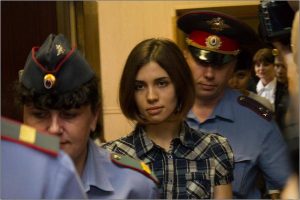
Nadezhda Tolokonnikova (Pussy Riot) at the Moscow Tagansky District Court. Photo by Denis Bochkarev.
This file is licensed under the Creative Commons Attribution-Share Alike 3.0 Unported license. (The use of this photo by FRIDA does not in any way suggest endorsement of FRIDA or the photo’s use by the author.)
By Barbora Němcová/FRIDA
Nadezhda Tolokonnikova, one of the jailed members of Pussy Riot, a Russian feminist punk rock protest group, has vanished from sight almost two weeks ago, her family says.
Nadezhda and two other group members – Maria Alyokhina and Yekaterina Samutsevich – were arrested in March 2012 after a protest at Moscow’s Cathedral of Christ the Savior. Dancing and shouting “Mother Mary please drive Putin away,” the group criticized the close ties between church and state in Russia. Later in 2012, Nadezhda and Maria were convicted of hooliganism inspired by religious hatred and sentenced to two years in prison.
After more than a year in prison, Nadezhda announced a hunger strike to bring attention to brutal conditions and threats of violence from prison camp guards in September of this year. As a result, the 23-year-old was moved from the Mordovia jail to a different prison colony. While her husband Pyotr Verzilov called this “a great victory” last month, the family is not so sure anymore as they have not been informed of her location since October 21. Her father Andrey said on November 1: “We don’t even know which part of Russia she is now in. This is a kidnap.”
While the case started with a protest against the problematic relationship of church and state in Russia, it has grown to be about much more than that: feminism, women’s rights, but also human rights in general. Some have argued that many Russians are “outraged by the group’s overt feminism and disregard for religion.” As feminism remains a difficult subject in Russia, Pussy Riot find more support abroad than in their home country. “The simplest example is the idea that there’s a [male] producer behind us, or that we must be being paid by foreign governments – nobody can imagine that women themselves are expressing their opinions!” said one of Pussy Riot members – who calls herself Schumacher – during an interview earlier this year.
“In the Russian mass media,” she continues, “they’re saying we’re stupid girls, not able to think. Among the orthodox believers, in the media, they tell us to stay at home, do cooking, give birth to children.” This claim is troubling for several reasons. The obvious one, which is the reduction of a woman to domestic and child-bearing functions, but also because both Nadezhda and Maria are mothers, mothers who were sent to prison camps far away from their children for such a questionable crime.
According to Schumacher, Pussy Riot frighten people because they are a feminist group with no men connected to it, a female group with no male leaders. We still have a long way to go and many battles to fight in Russia.
What are your thoughts on Pussy Riot? Can you relate to their struggle?